Think “van life” and maybe you picture a morning view out the back door, overlooking an ocean vista, steaming cup of coffee in hand.
Now take that same picture—with a bit more hot coffee in a larger thermos—and imagine waking up to a snow-filled landscape, all white and glittery, out the back door, steps away from the ski slopes.
Winter camping in an RV requires more preparation and planning than camping in warmer seasons. Your rig will feel smaller. The traveling is slower going. But the access an RV can provide to winter wonderlands is well worth the extra effort and the icy roads.
Before you set out for snowier pastures, here are a few things to think about to make winter camping in an RV go smoothly and safely, while ensuring the pipes don’t freeze and you aren’t forced to turn around at chain control checkpoints.
Make Sure Your RV is “Winterized”
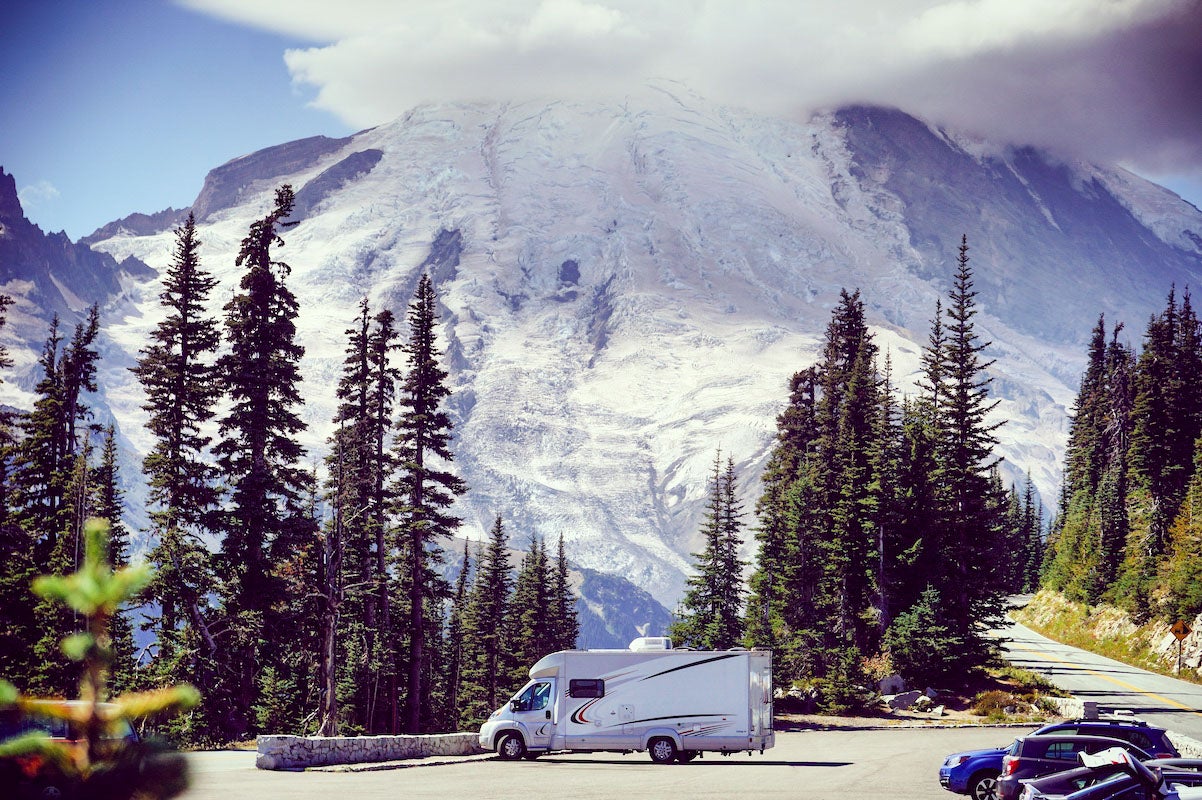
Looking up at Mt. Rainier
What does it mean to winterize your RV?
In short, winterizing is about taking a few extra steps to ensure your vehicle is thoroughly prepared for all the challenges that freezing temperatures can throw at it.
Precautions are needed to make sure that the water and sewer lines don’t freeze, and that moisture doesn’t leak through any vulnerable spots like walls, doors, and windows. Essentially anything vulnerable to icy winds and sub-freezing temperatures needs to be reinforced and insulated.
Plan Your Route & Be Prepared
Camping in the winter is always going to require extra planning, and RV camping is no exception.
No matter where you’re going, if you’re hitting the road in the winter months, make sure you look ahead on the map so you can anticipate any high-elevation mountain passes you might have to cross. You should expect any mountain roads with snow on the ground may all but require chains, and could even have chain control checkpoints.
Wherever you’re going, give yourself ample time to get there. And whenever you’re pulling out onto an icy road, drive slowly, and avoid any abrupt braking or accelerations.
Check The Weather Forecast and Anticipate Icy Road Conditions
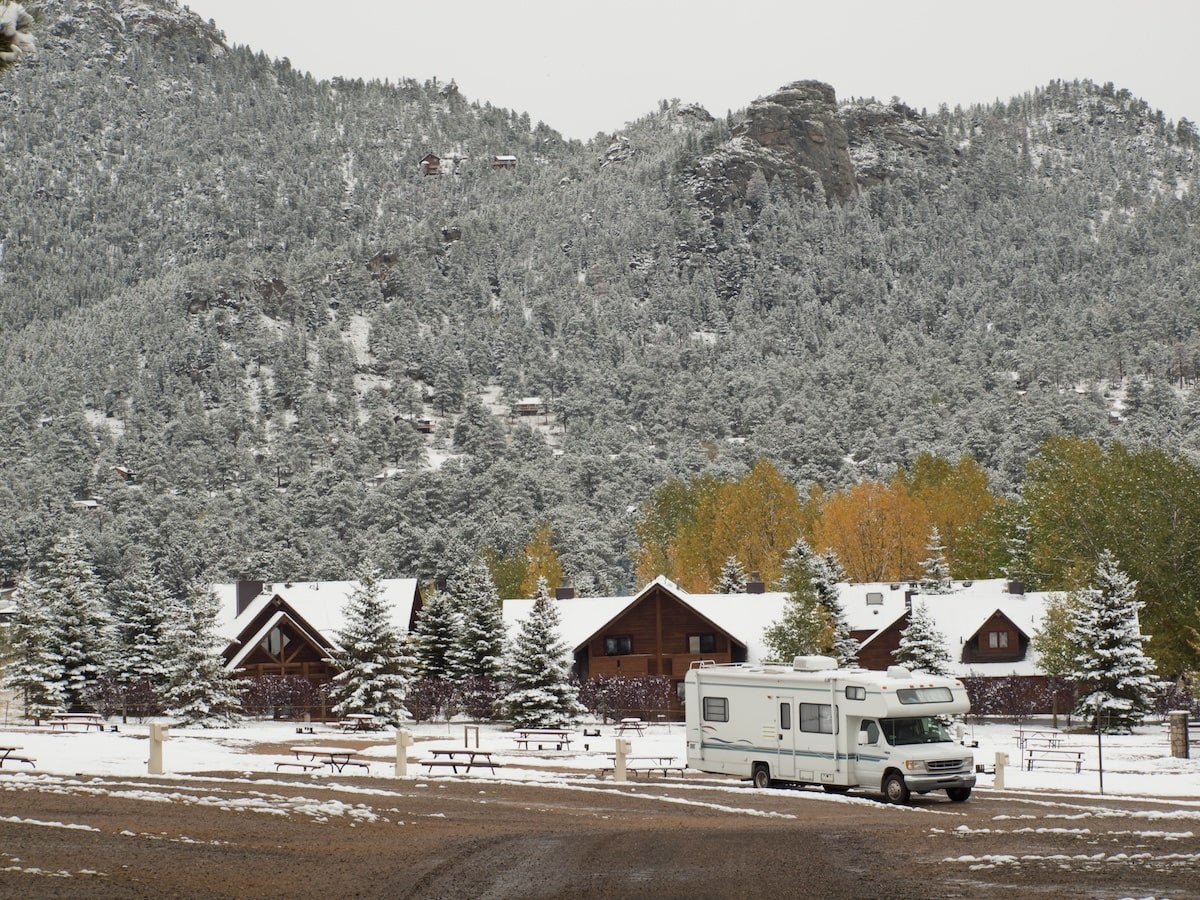
Next, cross-reference your travel itinerary with the weather forecast.
Even if you’re heading south, bound for warmer and drier climates, you might have to travel through a blizzard to get there, and if you’re driving through a snowstorm, you want to be prepared.
Bring chains for your tires, or make sure you have snow tires and four-wheel drive. Make sure you also have extra quantities of all the essentials — water, food, propane, and clothing — so if you get stuck on the road, you’ll be ok while you’re waiting for roadside assistance, which can take awhile in the middle of winter.
Pay attention to winter weather warnings and advisories, issued by The National Weather Service. When road authorities tell drivers to stay off the roads, follow their lead.
Have a Backup Plan
Sometimes Mother Nature has her own plans, and when she intervenes, there’s really not much you can do about it. Having a backup plan will serve you well in those times.
Maybe it’s an alternate route to get to your final destination. Or it could be another place to stay in case you can’t make the full journey because the road is closed or chain control has backed up traffic for hours.
Slow and steady is the theme of winter road trips, and having a backup plan is like a pressure valve you can release when the pressure mounts.
What to pack: Here’s the gear you need to bring on your Winter RV camping trip.
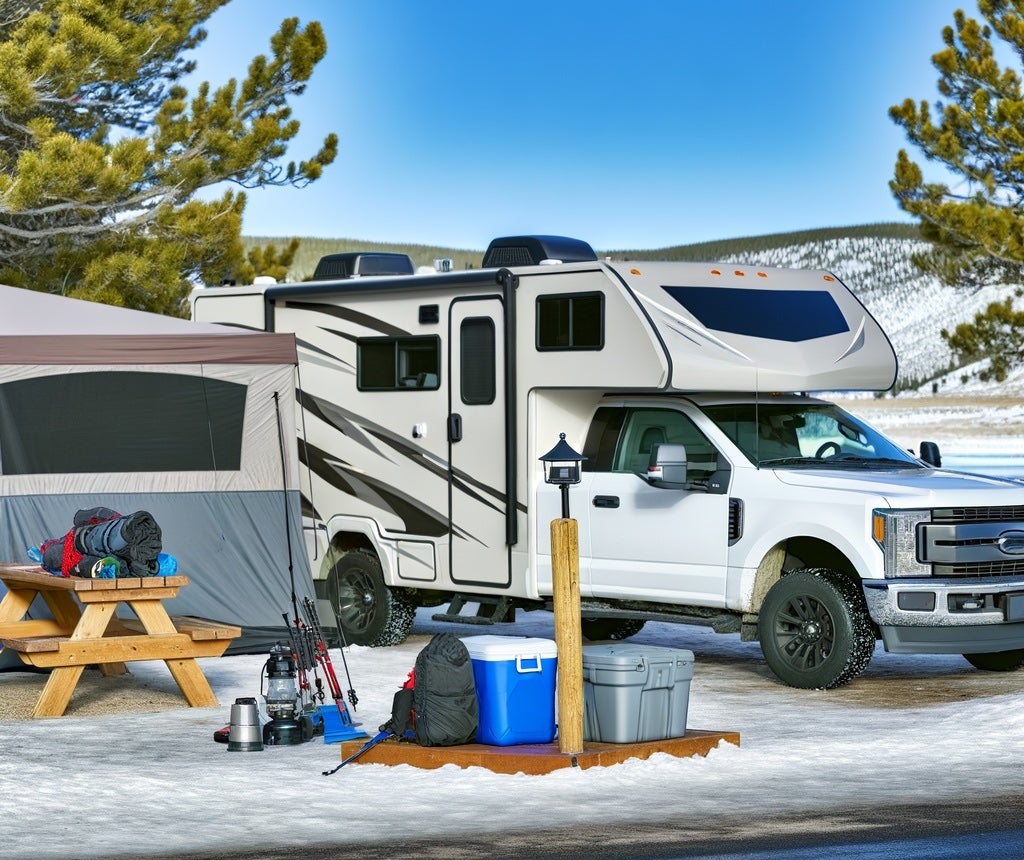
So you’ve got a plan, and a backup plan. Now it’s on to packing for your winter RV camping trip. Here’s one tip: Pick up a pack of those hooks that you can stick on the wall, because you’re going to need extra places to hang all those cold, wet jackets.
A Portable Heater
Mr. Heater Portable Buddy is a portable heater that’s easy to carry around, and fast to warm up. It’s one of those pieces of gear that you’ll be so happy you have when you’re camping in the winter.
It’s got enough power to heat up the inside of an RV, and on those chilly mornings, it’ll be the godsend to help you jump out of bed and make some coffee.
Amazon has a wide variety of Mr Heater products to choose from, click here to see some of the options.
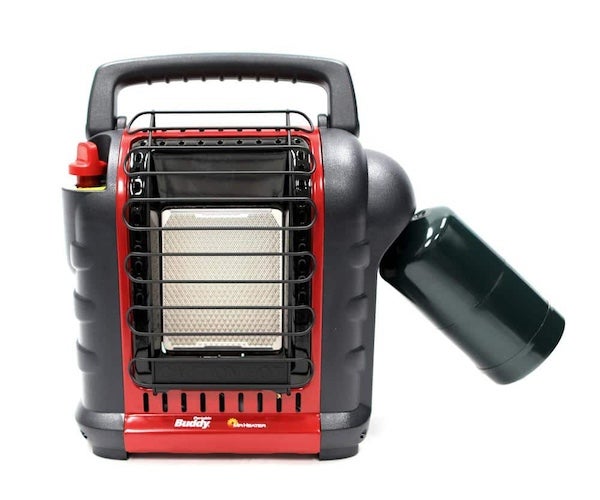
Insulation—For Yourself and Your RV
Not only do you want to pack enough layers for yourself, you’ll also want to make sure your RV has enough insulation so the warm air stays in and the cold air stays out.
When you’re packing your bags, know that synthetic insulation works better in cold, wet climates compared to down. So bring puffy jackets made with synthetic materials, like the Arc’Teryx Atom, a longstanding and highly rated jacket ideal for layering between thermals and waterproof, windproof shells.
For the RV, look for window and vent covers that will lower condensation and keep air flowing. RV skirts wrap around the lower belly of your rig, providing that extra layer of reinforcement when you’re setting up camp in harsh winter weather.
Two Essential Winter RV Camping Tips
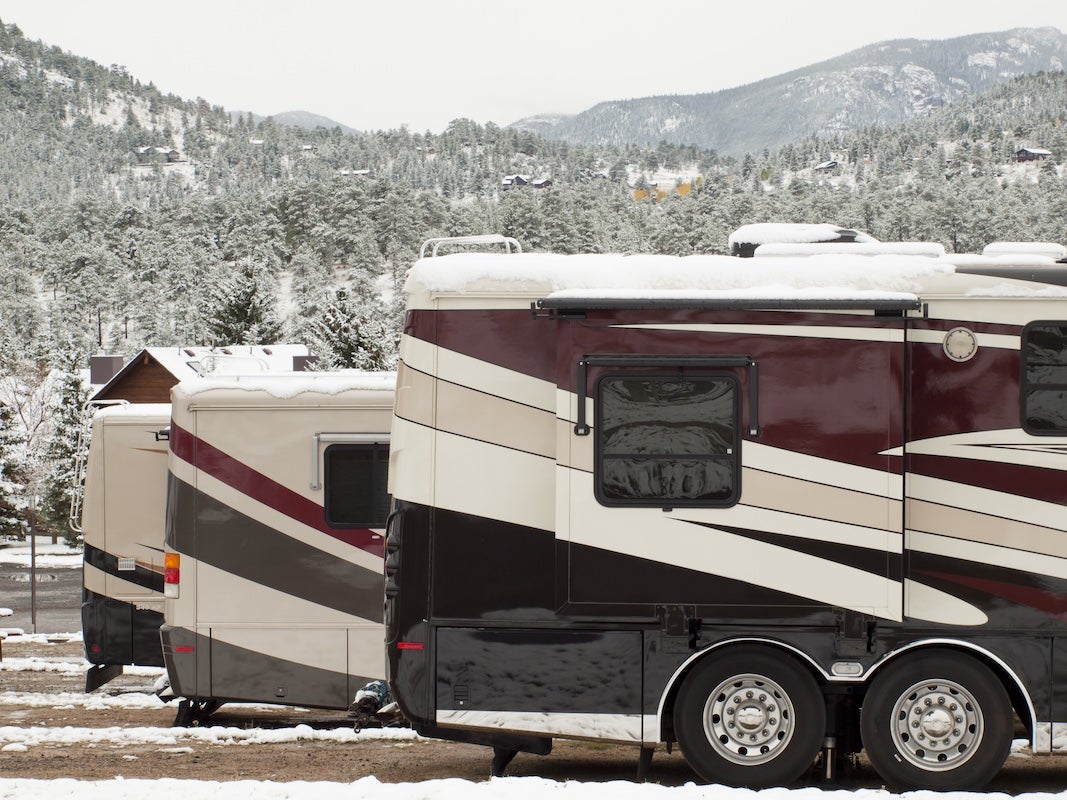
When you’re camping in the winter, there are all sorts of hacks and tricks that will make life on the road so much easier — and warmer.
There’s the tried-and-true hot water bottle trick. Boil some water, fill up an insulated water bottle, like a Nalgene, stick it in your sleeping bag or your bed, and you’ve got yourself an individual heater to keep your toes warm while you fall asleep. Also, consider electric blankets for your RV.
A reliable windshield brush and ice scraper is a must for any vehicle traveling through blizzards, across winter roads.
For an RV, upgrade that brush to a shop broom with a handle long enough to help you sweep the snow from the roof of your vehicle. It’s illegal to drive with a load of snow on your roof, not to mention a scary situation when you hit the brakes and a load of snow falls onto your windshield. Sweeping off the snow before you drive is a must.
Read More Winter RV Camping Tips
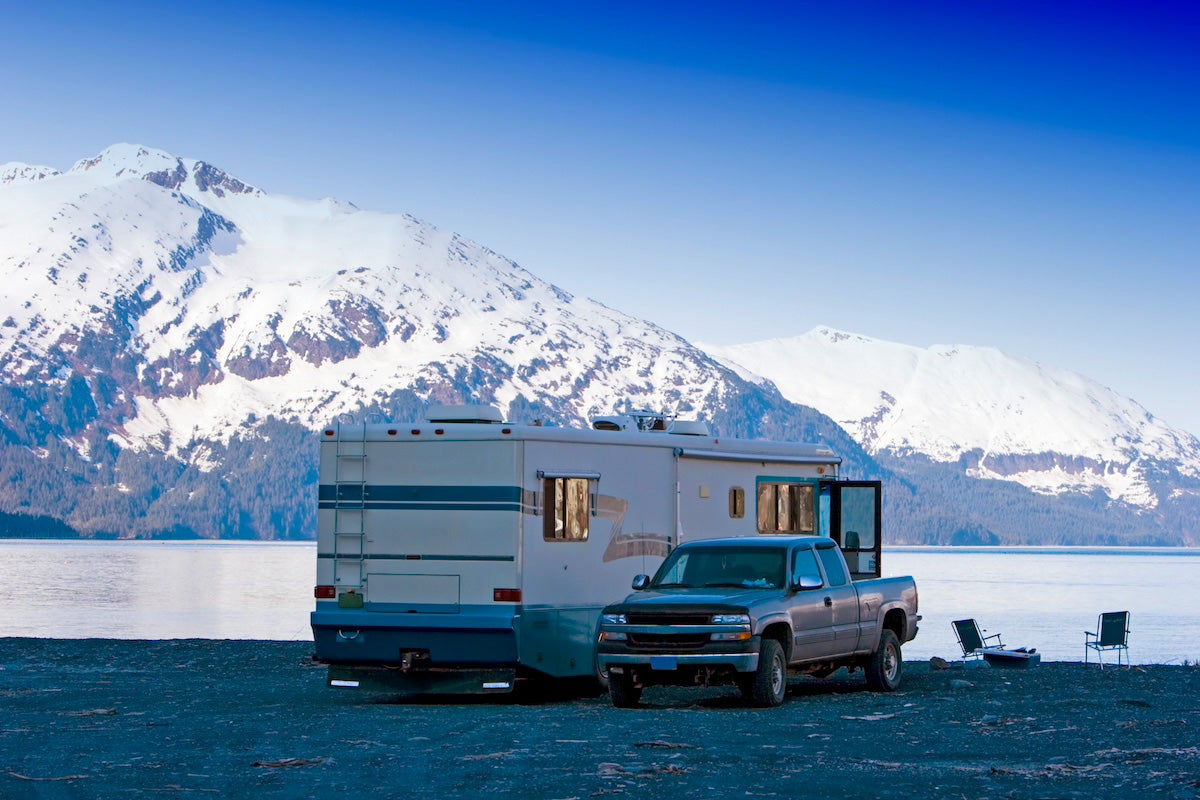
We asked some RV pros what they recommend for winter camping. Among the long list of advice they provided were items like heat tape to keep water lines warm and a temperature gauge to help you know when your RV’s plumbing is in danger of freezing. And carry antifreeze with you, just in case.
And don’t forget to use The Dyrt’s comprehensive maps and search functions to scout some of the best slopeside camping locations for your winter pastimes.
The post Winter RV Camping Tips – Best Ways to Plan & Prepare For a Snowy Trip appeared first on The Dyrt Magazine.
Original source: https://thedyrt.com/magazine/lifestyle/winter-rv-camping-tips-best-ways-to-plan-prepare-for-a-snowy-trip/


